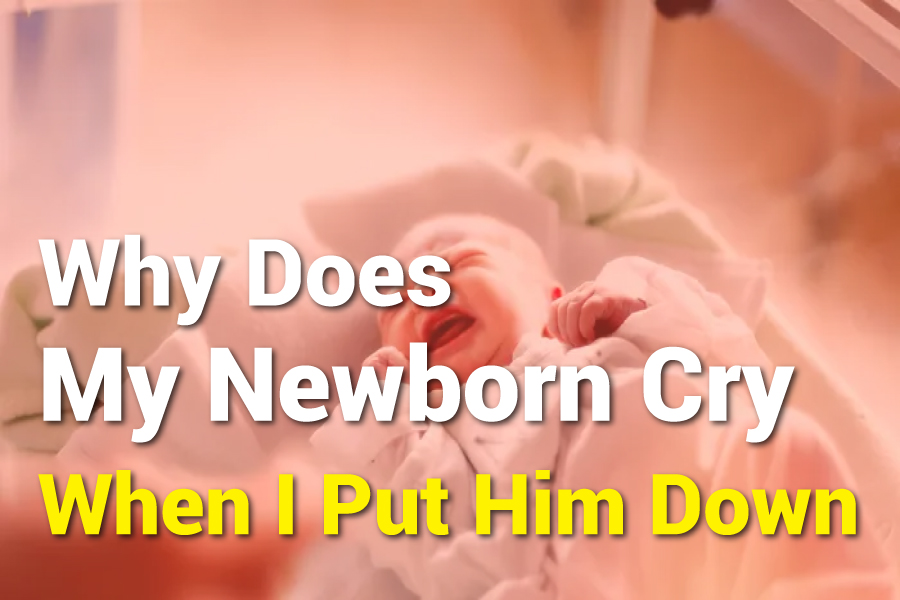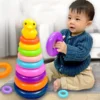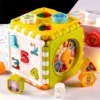Probably among the most difficult things to understand or accomplish as new parents is to make sense of your newborn crying when you put him down. Sometimes, this problem can cause much stress and may make one worried; hence, finding answers or looking for possible solutions becomes an overwhelming task. It is crucial to understand why your baby cries at these moments for your peace of mind and the well-being of your baby. Babies cry as a way to talk about their needs and discomfort. Therefore, it would give you knowledge of what to understand they might be trying to put across so that you could respond effectively. In this article, we’ll consider reasons your newborn may cry when you put them down and provide some practical tips for soothing. By giving you an insight into your baby’s behavior and needs, we can create an environment more comforting to your little one. Let’s see some of the possible causes of distress in your baby and ways to soothe them.
Why Does My Newborn Cry When I Put Him Down?
Newborns cry when put down due to separation anxiety, the need for physical closeness, or discomfort. They feel secure in their parent’s arms and maybe unsettled when alone. Addressing their need for comfort, ensuring they are not in pain, and using soothing techniques can help reduce crying.
Understanding Why Newborns Cry When Put Down
Newborns cry mostly when put down for the following reasons. The greatest reason is separation anxiety. The baby used to be near people always, particularly their mothers, who provided constant presence and warmth. Being put down can make them very insecure and make them scared. This fear of being left alone is a way of instinct that makes them stick closer to their caretakers.
Another reason is that they need to be close and comforted physically. The closeness of the parents comforts the newborn. The warmth, smell, and heartbeat of a parent are irrational things that can provide feelings of security and comfort that are hard to receive when they are put down. This need for closeness is a part of their natural development.
Physical discomfort can also be a cause. Newborns have really sensitive digestive systems, and lying down could make them irritated due to gas or reflux. Moreover, they may be in periods of growth spurts or teething; one or the other will make them extremely fussy and in need of more contact comfort in general.
This extends to patterns and cycles of sleep. The sleep cycles of a newborns are shorter and usually awake with short rest. When they wake up, they cry to be reassured and comforted in case they are not in familiar and comfortable surroundings.
Finally, overstimulation is another possible cause of crying in a newborn. Newborns are still accustomed to the world; hence, they can be easily overcome by the lights, sounds, and activities involved. They cry as a means of letting others know that they need to take time off the stimuli and spend some time in peace.
Common Causes Of Crying In Newborns
1. Separation Anxiety
A newborn is biologically wired to get close to the care provider. Being put down will then trigger feelings of separation anxiety, which manifests with crying. This is an instinct, that allows a young and helpless human being to ensure his or her safety and survival. This type of anxiety can be calmed down by providing a sense of security through touch and presence.
2. Need for Physical Closeness
The parent’s physical closeness provides warmth, comfort, and a sense of security to the newborn. This gets lost as they are put down, which then causes them distress, resulting in crying. Swaddling and holding your baby close can bring back these comfortable sensations.
3. Physical Discomfort
These physical discomforts, which some newborns experience with problems like gas, or reflux, or teething, are increased by lying down and hence the increased crying. These problems can be alleviated with gentle burping and keeping the baby upright for a short time after feeding. Teething discomfort can be alleviated by providing relief to the teething.
4. Sleep Patterns and Cycles
Sleep patterns of newborn babies are highly variable. They have short sleep-wake cycles, and they wake up very frequently to reassure them and cry for comfort. However, one can establish better sleep patterns by providing a regular bedtime routine and a comforting environment for sleep.
5. Overstimulation
Newborns can easily be overstimulated by their environment. Too much noise, light, or activity will make them cry due to overstimulation. Therefore, recognition of the signs of overstimulation and the provision of a quiet and soothing environment will help a lot in calming them down.
Soothing A Crying Newborn
Newborns cry to express their needs and discomforts. Below are some strategies that enable one to pacify them:
- Wrapping: A good, snug blanket wrapping for your baby will provide comfort and security for him.
- Close contact: Holding/Rocking – Gently rock or hold the baby close to his child to give him comfort with the touch and action.
- White Noise: Soft background sounds, such as from a fan or white noise machine, quiet a crying baby by producing the sounds of the womb.
- Pacifier: The pacifier provides comfort through sucking, which is essentially natural to the baby for calming down.
- Feeding: Sometimes a baby cries due to hunger. Immediate hunger can be easily soothed by giving a feed, thereby comforting the baby.
Alternative Perspective Concerning Crying
One should realize that crying is an integral part and parcel of the growth of an infant baby. Knowing this is a major form of communication for the infant may help one’s perspective when this falls hard on the distressed ear of a parent. Babies cry over needs: being hungry, tired, uncomfortable, or just wanting to be comforted. Understanding that crying is not simply a challenge to overcome but one of the ways your baby communicates with and relates to you can be very helpful. It helps in bonding if one responds quickly, empathetically, and patiently to the cries of the baby. It reassures him that he is secure and builds the bond between the two of you. Second, it is also important during this stage to take good care of your emotional and physical well-being. It might be more manageable to stay calm and responsive when you have some support and understand that it is fine to take a break if needed.
Ways To Minimize Crying
Routine
Make your baby more secure in a setting that would reduce the crying. Have your baby on a daily routine of feeding, sleeping as well as playtimes, creating a predictable environment that might soothe your baby.
Soothing Techniques
These techniques for calming a crying baby include swaddling, gentle rocking motions, and white noise. You can attempt each method separately as you try what works best for your baby.
Ensure Comfort
Check for any signs of physical discomfort, such as a wet nappy or tight clothing; the child could also manifest the symptoms of an illness. Fixing this problem can make him stop crying.
Offer a Pacifier
Some babies are comforted by sucking on the pacifier and it often stops them from crying. Just make sure to have a clean and safe pacifier for your baby.
Keep Calm and Be Patient
Your baby can sense your emotions; therefore, trying to calm your baby can give a better atmosphere for both of you when you remain calm and patient.
Conclusion
Understanding why your newborn cries when you put him down can make all the difference in understanding their needs and offering them comfort. By recognizing what makes them cry, such as separation anxiety, a mere need for physical closeness, or physical discomfort, you will be in a better position to answer. So, in a nutshell, some soothing techniques, a maintained routine, and keeping your baby comfortable might help in reducing crying and give way to an enabling environment. Remember, crying is a natural way for your baby to communicate. Your responsive and empathic care reassures him of security in being loved.
Frequently Asked Questions:
Why Does My Newborn Cry When Put Down?
Newborns cry when put down either due to separation anxiety or because of the need for physical closeness and comfort; this also includes physical discomfort.
How Can I Calm My Crying Newborn?
Other methods include swaddling, holding, and rocking, white noise, giving him a pacifier, and making sure he is full.
Is It Normal For Babies To Cry That Much?
Yes, it is normal for neonates to cry since it is their only means of communication. It aids them in expressing their wants and discomforts.
What Can I Do If My Baby Gets Overstimulated?
If the child is over-stimulated, provide a quiet and soothing environment and work toward keeping noise and light levels low. Provide an alternative comfort or soothing activity.
When Should I Be Concerned About My Newborn’s Cry?
Consult a pediatrician if the crying goes on for an excess, if your baby seems to appear unsatisfied, or if crying at times is accompanied by fever, vomiting, or diarrhea









